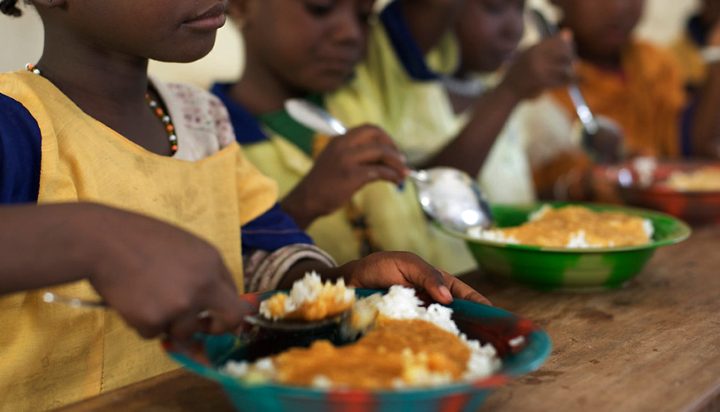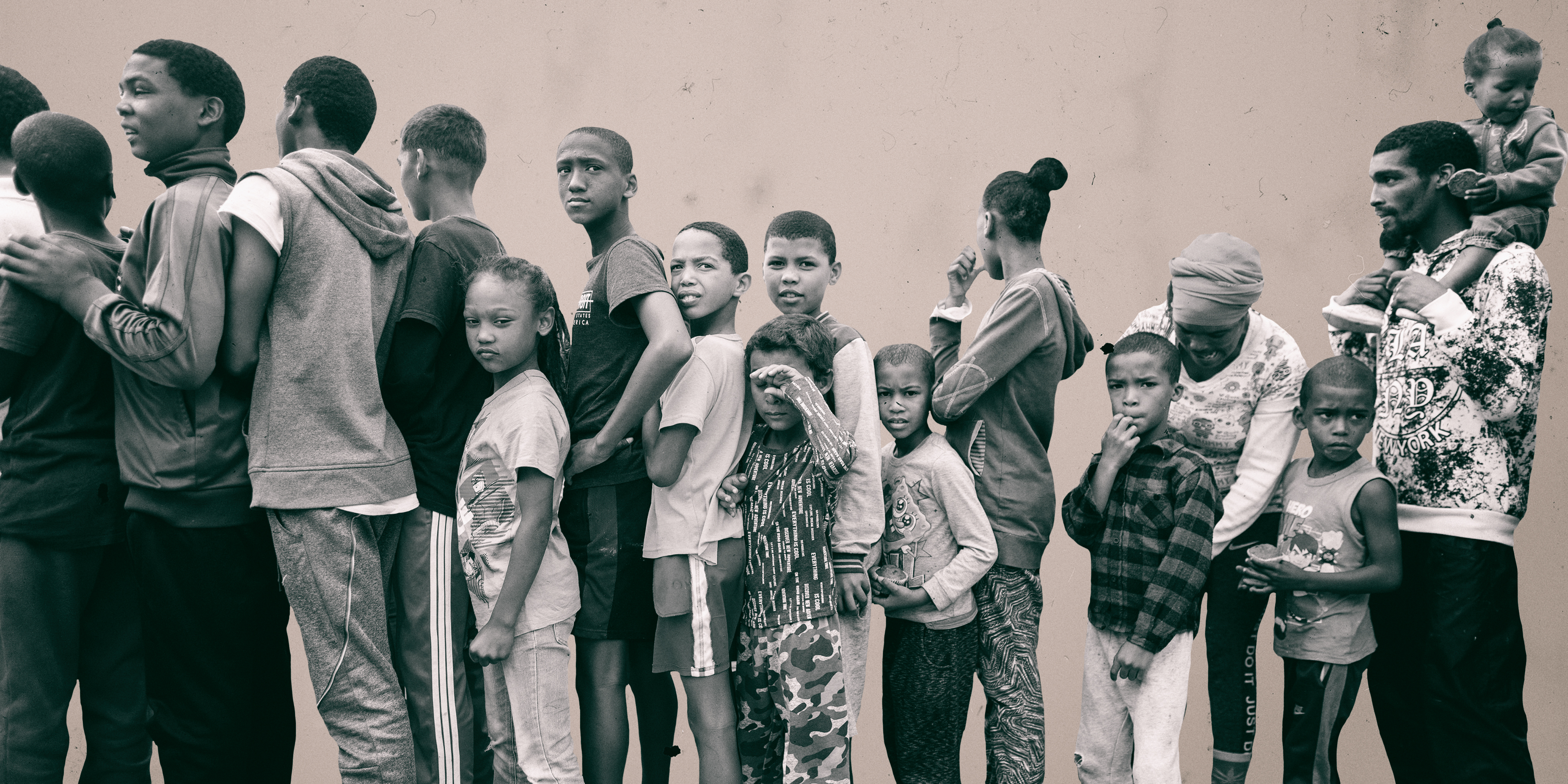CHILD HUNGER
Who’s right? Court battle over children’s rights to education and basic nutrition

In court papers filed last week, the Department of Basic Education has claimed that the National School Nutrition Programme commenced again for all learners on 22 June 2020, making the legal action brought by Equal Education and two Limpopo School Governing Bodies ‘moot’. But Equal Education denies that the programme has resumed and claims that millions of children are still not receiving food.
On 12 June 2020, SECTION27 and the Equal Education Law Centre (EELC) filed urgent papers in the North Gauteng High Court in a desperate attempt to address the dire situation in poor schools where nearly 10 million learners are no longer receiving food at school. This was after the Covid-19 lockdown led to the suspension of the National School Nutrition Programme (NSNP) – which provided the only square meal for the day for these learners.
Maverick Citizen has published the heart-rending affidavits of children denied food as a result of the NSNP suspension (see here, here, here).
In the high-stakes case, Equal Education is asking the court to declare school meals an integral part of the right to basic education and to resume the NSNP for all learners. They have asked the court to order that the DBE produce a plan and programme for the resumption of school feeding and that they report back to the court every 15 days on their progress – this is known as a supervisory order.
The Department of Basic Education (DBE) is opposing the litigation. On 22 June 2020, SECTION27 and EELC received the DBE’s answering affidavit, which was deposed to by Director-General Mathanzima Mweli.
In the affidavit, Mweli explains the context within which schools had closed and the programme was suspended on 18 March 2020. While admitting the importance of the NSNP to millions of learners, Mweli says that Covid-19 “threw everything into chaos”; the NSNP was suspended because there was a fear that children would become “walking virus bombs”, posing a threat to themselves and family members.

A child holds a plastic tub on his head to collect food from a feeding program in Lavender Hill on April 17, 2020 in Cape Town, South Africa. (Photo: Gallo Images/Brenton Geach)
Mweli argues that, at the time of the lockdown, the DBE believed that:
“Because the Disaster Management Regulations did not provide for school nutrition as an ‘essential service’ … all key stakeholders in the Basic Education Sector concluded that school feeding would not only be unlawful… but undesirable as young learners would violate the law by leaving their homes.”
However, since then, Mweli claims the understanding of Covid-19 has evolved and the DBE has been doing everything in their power, and plan to restart the NSNP. As a result, he questions the bona fides of the litigation and suggests that the DBE had been led into “litigation by ambush in correspondence” rather than a genuine desire by Equal Education to alleviate the hunger of millions of learners and ensure their right to basic education.
Nonetheless, his affidavit informed the court that the NSNP had resumed for all learners on 22 June 2020 – thus making the case “moot”.
In support of this claim, the DG provided supporting affidavits from Minister Angie Motshekga and eight provincial MECs.
A number of other justifications are also attempted for the suspension of the NSNP. For example, the DG argues that according to the Public Finance Management Act (PFMA): “This Conditional Grant is made available on the basis that the NSNP is designed to run and operate when schools are in session, in other words on school days when the schools are open. The legal authorisation thereof is thus for a feeding Programme in school, and to go outside these parameters will be unlawful…”

A South African child stands in line as he waits for food in Masiphumelele, Cape Town, South Africa, 25 May 2020. (Photo: EPA-EFE/NIC BOTHMA)
Following the logic of his argument, the DG goes on to state that outside of normal school terms, food support to children is the responsibility of the Department of Social Development (DSD).
Mweli also argues that the NSNP is not part of educational legislation. He said that when schools closed unceremoniously on 18 March 2020, the national and provincial departments no longer had the capacity to continue the NSNP and that the Disaster Management Regulations did not make provisions for the mass catering of food and large gatherings, which was the general form the feeding scheme took.
He said that to mitigate this, DBE worked with DSD to locate and assist affected families that had been the recipients of the NSNP in the form of food parcel distribution through national community food distribution centres.
For example, at a meeting between DBE, DSD and the Department of Health, it was decided that DSD would distribute food parcels to needy households and “will utilise the Disaster Relief Management and Social Relief Funds of some R900-million and R500-million respectively for food parcels”.
He said that while the NSNP was managed through a conditional grant, the grant alone was insufficient to cover the food needs and was supplemented by partnerships in the private sector. These partnerships too were adversely affected by the onset of the Covid-19 lockdown regulations. There were, however, some who were able to still make donations, with the Solidarity Fund joining these donors and partnering with DSD to distribute over 58,000 food parcels.
The DG said that all partner donations were directed to DSD as the channel for distribution to recipients of the NSNP as agreed at the meeting on 23 March 2020.
Empty promises?
In their replying affidavit filed on 24 June 2020, Noncedo Madubedube, the General Secretary of EE, takes issue with many of Mweli’s claims; “contradictions and misleading statements made by the Minister and other officials about when the NSNP would resume”.
EE points out that the core of their case was that when schools reopened on 8 June 2020, the NSNP should have resumed for all qualifying learners, not just learners in Grades 7 and 12. According to the DG’s affidavit, the DBE now intended to provide food for qualifying learners by 22 June 2020 (the same day his affidavit was filed).
However, in response to this, EELC and SECTION27 argue that the department’s undertaking to provide food for all qualifying learners “was brought about by this application” and that as a result, as their research reveals, the NSNP is being hastily, poorly and only partially implemented.
To demonstrate this, on 23 June 2020 (with only one day available to them) SECTION27, EE, the Legal Resources Centre (LRC) and other activists had “conducted an urgent investigation of what is actually the position on the ground”. Their enquiries from schools and learners across the country revealed that there were still many learners who are not receiving food, making the department’s claims “an empty promise” and “a last-minute attempt to reverse the course provoked by the application”.
In Limpopo, for example, they had contacted 45 schools. All denied the full resumption of the NSNP, or that they had received communication from the DBE to this effect.
According to Madubedube’s affidavit in Limpopo:
“18 of the schools reported that the food delivered for the Grade 7 or 12 learners was insufficient even to feed learners in those Grades. Learners are being sent home early; asked to bring extra food, or given smaller portions; or principals, educators or SGBs are funding the purchase of additional food for the Grade 7 and 12s.”

Of paramount concern was the fact the National Nutrition Programme did not run during the lockdown, which left even more children hungry. (Photo: EPA / Nic Bothma)
The picture was similar in other provinces.
In KwaZulu-Natal, nine schools and 10 parents were contacted, but only five of the schools were providing food to all learners, even though one of them had received food only for Grade 7s.
In Mpumalanga, two schools were contacted and only one was feeding all learners while the other was feeding Grade 7s only.
In the Eastern Cape, of the 15 schools contacted, only three reported having received enough funding to feed all Grades.
In Gauteng, 13 parents and two learners were contacted. The parents said that their children had not been receiving food at school, neither had they received any communication regarding the NSNP.
EE has asked the court to admit these findings as evidence.
What this research points to is inconsistency and chaos in the resumption of the NSNP. In the words of Madubedube’s affidavit: “the consequences of this daily and continuing non-compliance with the Constitution are of the most serious kind: a very large number of children will go hungry and some may starve.”
Children’s best interests are paramount
In their reply, SECTION27 and EELC also pointed out instances of the department contradicting itself regarding their understanding of the constitutional right to basic education.
The department did not seem to see the link between nutrition and food as being critical in ensuring that learners were able to learn in an environment that was nurturing, and encouraged education by preventing them from attending classes on an empty stomach.

South African children receive biscuits from the Groundbreakers community feeding program in Ocean View, Cape Town, South Africa, 13 April 2020. (Photo: EPA-EFE/NIC BOTHMA)
The precise meaning of children’s rights to basic nutrition, basic education and the duty of the state to always ensure that “a child’s best interests are of paramount interest in every matter concerning a child” are addressed in Heads of Argument that were filed over the weekend by the Centre for Child Law, admitted as an amicus curiae in the case, as well as the applicants.
The matter is now set down for a hearing by the North Gauteng High Court on 2 July 2020. Despite the DBE’s protestations that it is fulfilling its responsibilities, EE will continue to seek a supervisory order, requiring the DBE to report back to the court on implementation of the NSNP, to ensure that it fulfils its undertaking.
A great deal is at stake. The court is being asked to ensure that 9.6 million learners’ rights to basic education, entrenched in section 29 and the right to “basic nutrition” which is entrenched in section 28 of the Constitution are upheld.
It’s hard to imagine a more important test of the Constitution’s promises at a more crucial moment in our democracy. DM/MC
"Information pertaining to Covid-19, vaccines, how to control the spread of the virus and potential treatments is ever-changing. Under the South African Disaster Management Act Regulation 11(5)(c) it is prohibited to publish information through any medium with the intention to deceive people on government measures to address COVID-19. We are therefore disabling the comment section on this article in order to protect both the commenting member and ourselves from potential liability. Should you have additional information that you think we should know, please email [email protected]"





 Become an Insider
Become an Insider